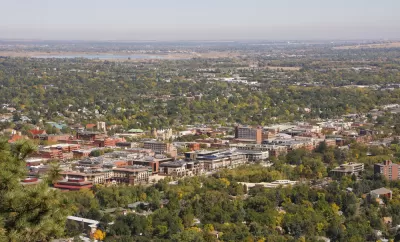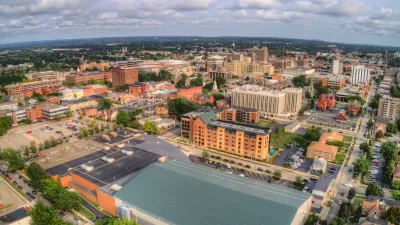From opportunity zone to 'opportunity-free zone.'

"[The] Boulder City Council voted 6-3 to temporarily ban development of office space and demolition of apartment buildings in a broad eastern swath of the city designated as a federal opportunity zone," reports Shay Castle.
The decision prompted a soundbite that could only happen in 2018. Councilmember Bob Yates, one of the votes against the moratorium had this to say in response to the final decision: "With this moratorium, we just turned an opportunity zone into an opportunity-free zone."
The moratorium is drafted to remain in place through June 2020. In the meantime, the city is working on completing zoning regulations to implement the recently completed Boulder Valley Comprehensive Plan. New zoning regulations could move up the expiration date of the moratorium.
Although it's not totally clear from the article, it's implied that the moratorium was approved out of concern over potential investments following incentives provided by the federal Opportunity Zone program. According to statements by Councilmember Sam Weaver, the comp plan prioritizes the preservation or retail, while increasing housing and curb office spaces.
The implication, then, is that the Opportunity Zone program places those goals at risk. The moratorium was thus drafted in "emergency." City Councilmember Jill Alder Grano had this to say about whether the term was warranted: "To call this an emergency, as a member of the public I lose a little faith….It's a terrible way to govern."
FULL STORY: 'Opportunity-free zone:' Council bans development, demolition in east Boulder

Alabama: Trump Terminates Settlements for Black Communities Harmed By Raw Sewage
Trump deemed the landmark civil rights agreement “illegal DEI and environmental justice policy.”

Planetizen Federal Action Tracker
A weekly monitor of how Trump’s orders and actions are impacting planners and planning in America.

The 120 Year Old Tiny Home Villages That Sheltered San Francisco’s Earthquake Refugees
More than a century ago, San Francisco mobilized to house thousands of residents displaced by the 1906 earthquake. Could their strategy offer a model for the present?

In Both Crashes and Crime, Public Transportation is Far Safer than Driving
Contrary to popular assumptions, public transportation has far lower crash and crime rates than automobile travel. For safer communities, improve and encourage transit travel.

Report: Zoning Reforms Should Complement Nashville’s Ambitious Transit Plan
Without reform, restrictive zoning codes will limit the impact of the city’s planned transit expansion and could exclude some of the residents who depend on transit the most.

Judge Orders Release of Frozen IRA, IIJA Funding
The decision is a victory for environmental groups who charged that freezing funds for critical infrastructure and disaster response programs caused “real and irreparable harm” to communities.
Urban Design for Planners 1: Software Tools
This six-course series explores essential urban design concepts using open source software and equips planners with the tools they need to participate fully in the urban design process.
Planning for Universal Design
Learn the tools for implementing Universal Design in planning regulations.
Clanton & Associates, Inc.
Jessamine County Fiscal Court
Institute for Housing and Urban Development Studies (IHS)
City of Grandview
Harvard GSD Executive Education
Toledo-Lucas County Plan Commissions
Salt Lake City
NYU Wagner Graduate School of Public Service





























